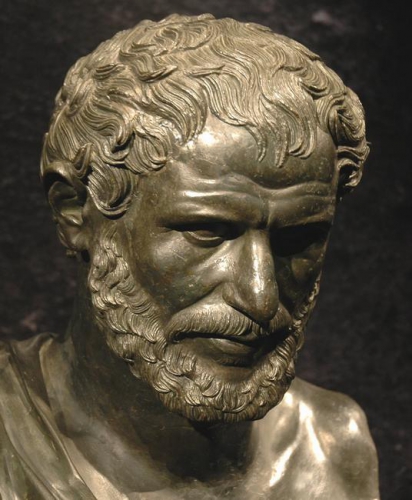The ancient philosopher Heraclitus of Ephesus (530-470 BC) is one of the most important thinkers in history. Heraclitus’ views on change and flow stand in stark contradition to the picture of the static universe presented by his predecessor Parmenides (5th century BCE), and fed into the work of untold philosophers from Marcus Aurelius (121 AD–180 AD) to Friedrich Nietzsche (1844-1900 AD).
Heraclitus’ philosophy is a good starting point for anyone concerned with change in life. Heraclitus said that life is like a river. The peaks and troughs, pits and swirls, are all are part of the ride. Do as Heraclitus would – go with the flow. Enjoy the ride, as wild as it may be.
Heraclitus was born into a wealthy family, but he renounced his fortune and went to live in the mountains. There, Heraclitus had plenty of opportunity to reflect on the natural world. He observed that nature is in a state of constant flux. ‘Cold things grow hot, the hot cools, the wet dries, the parched moistens’, Heraclitus noted. Everything is constantly shifting, changing, and becoming something other to what it was before.
Heraclitus concluded that nature is change. Like a river, nature flows ever onwards. Even the nature of the flow changes.
Heraclitus’ vision of life is clear in his epigram on the river of flux:
‘We both step and do not step in the same rivers. We are and are not’ (B49a).
One interpretation of this passage is that Heraclitus is saying we can’t step into the same river twice. This is because the river is constantly changing. If I stroll down the banks of the Danube, the water before my eyes is not the same water from moment to moment. If the river is this water (which is a debatable point – the river could be its banks, the scar it carves in the landscape, but let’s leave this aside), it follows that the Danube is not the same river from moment to moment. We step into the Danube; we step out of it again. When we step into it a second time, we step into different water and thus a different river.
Moreover, we step into and out of the river as different beings.
Most interpretations of Heraclitus’s river fragment focus on the idea of the river in a state of flux. But Heraclitus says more than this in this fragment: ‘We are and are not’.
The river changes and so do you.
We are familiar with the principle of biological generation and corruption. Heraclitus puzzled over this principle two thousand years before the birth of the modern biological sciences and drew the ultimate lesson for the human condition. As material beings, we live in a world of flux. Moreover, we are flux. As physical bodies, we are growing and dying all the time, consuming light and resources to replicate our structure, while shedding matter continuously.
Change and death are ubiquitous features of the natural world. Maybe this is what Heraclitus meant when he said, in his inimitable way:
‘Gods are mortal, humans immortal, living their death, dying their life’.
Or maybe not. With Heraclitus we can’t be sure. What we know of Heraclitus comes from his commentators (nothing survives of his original work), and so Heraclitean epigrams can seem dubious in provenance, attributable to other authors. Everything changes, and history has changed a dozen times since Heraclitus’ time; yet I believe we can still take value from Heraclitus, particularly in a time like today, which is so clearly calling out for deep institutional and infrastructural change (I am speaking to people who are looking to make deep changes in our environmental and energy systems; our political, representative and regulatory systems; in our economic system – market capitalism – which is intrinsically indebted to the kind of society we really don’t want to be, an industrial society).
I think that Heraclitus gets it right. Reality is change and flow.





 del.icio.us
del.icio.us
 Digg
Digg
Les commentaires sont fermés.